What is Atypical Hemolytic Uremic Syndrome (aHUS)?
Atypical Hemolytic Uremic Syndrome (aHUS) is a rare, serious disease characterized by the abnormal destruction of red blood cells (hemolysis), low platelet count (thrombocytopenia), and kidney failure due to damage in small blood vessels (microangiopathy). It is called “atypical” to distinguish it from the more common form of HUS, which usually occurs after infections like E. coli.
Causes
- aHUS is primarily caused by genetic mutations or acquired abnormalities that lead to uncontrolled activation of the complement system (part of the immune system).
- This overactivation damages the lining of blood vessels, causing clot formation in tiny blood vessels, especially in the kidneys.
- Triggers can include infections, pregnancy, certain medications, or autoimmune diseases.
Symptoms
- Fatigue and weakness (due to anemia)
- Reduced urine output or blood in urine
- Swelling, especially in the face, hands, and feet (due to kidney problems)
- High blood pressure
- Bruising or bleeding easily (due to low platelets)
- Confusion or neurological symptoms in severe cases
Diagnosis
- Blood tests showing anemia, low platelets, and evidence of red blood cell destruction (schistocytes on blood smear).
- Kidney function tests showing impaired function.
- Tests to exclude other causes of thrombotic microangiopathy (like typical HUS or thrombotic thrombocytopenic purpura (TTP)).
- Genetic testing for complement system abnormalities may be done.
Treatment
- Plasma exchange or infusion: To replace missing or defective complement regulatory proteins.
- Eculizumab (Soliris): A monoclonal antibody that blocks complement activation, now considered a first-line treatment.
- Supportive care such as blood pressure control and dialysis if needed.
- Kidney transplant may be considered in cases of kidney failure, but risk of recurrence exists without proper complement control.
Prognosis
- aHUS can be life-threatening, especially without treatment, but outcomes have improved significantly with complement-inhibiting therapies like eculizumab.
- Early diagnosis and treatment are crucial to prevent irreversible kidney damage and other complications.
